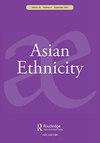Orientalist constructions of the frontier pashtuns: on the postcolonial history and repercussions
IF 0.8
Q3 ETHNIC STUDIES
引用次数: 2
Abstract
ABSTRACT This article seeks to explore the colonial encounters with Pashtuns of the erstwhile North West Frontier Province (now renamed as Khyber Pakhtunkhwa), Pakistan and their mythical Orientalist constructions in the colonial historical and ethnographic accounts of the late 18th, 19th, and 20th centuries. The recurring colonial images and the transformation of colonial discourses and post-colonial effects on Pashtun identity and society are analyzed in this research article. Noticeably, it looks into the paradigm shift from the anthropocentric views of Pashtuns to Orientalized and Europocentric ideas by applying Edward Said’s influential thesis of ‘Orientalism’ and integrating the work of other post-colonial thinkers. This research article draws upon archival, anthropological, ethnographic field data to supplement the textual analysis and challenge the Orientalist and colonial representation of Pashtuns. The ethnographic field data were gathered through in-depth interviews with various Pashtun intellectuals, poets, writers, and authors from various institutions in Peshawar and Charsadda. However, this research article demonstrates that there are colonial biases and Eurocentric constructions of Pashtuns in the colonial accounts and texts. The colonial biassed representations of Pashtuns are transformed into postcolonial discourses. Pashtuns and Pashtun society are still uncritically analyzed through colonial lenses and spectacles.边疆普什图人的东方主义建构:后殖民历史及其影响
本文旨在探讨殖民时期与巴基斯坦前西北边境省(现更名为开伯尔-普赫图赫瓦省)普什图人的相遇,以及18世纪末、19世纪和20世纪殖民历史和民族志中普什图人神话般的东方主义建构。本文分析了反复出现的殖民形象和殖民话语的转变,以及后殖民对普什图人身份和社会的影响。值得注意的是,本书通过运用爱德华·萨义德颇具影响力的“东方主义”理论和整合其他后殖民思想家的著作,探讨了从普什图人的人类中心主义观点到东方化和欧洲中心主义观点的范式转变。本文利用档案、人类学、民族志领域的资料来补充文本分析,并挑战普什图人的东方主义和殖民主义表征。民族志领域的数据是通过对来自白沙瓦和查尔萨达各机构的普什图知识分子、诗人、作家和作家的深入访谈收集的。然而,本研究表明,在殖民时期的记述和文本中,普什图人存在殖民偏见和欧洲中心主义的建构。对普什图人的殖民偏见被转化为后殖民话语。普什图人和普什图人社会仍然通过殖民时期的镜头和眼镜进行不加批判的分析。
本文章由计算机程序翻译,如有差异,请以英文原文为准。
求助全文
约1分钟内获得全文
求助全文
来源期刊

Asian Ethnicity
PHYSIOLOGY-
CiteScore
2.80
自引率
6.20%
发文量
27
期刊介绍:
In the twenty-first century ethnic issues have assumed importance in many parts of the world. Until recently, questions of Asian ethnicity and identity have been treated in a balkanized fashion, with anthropologists, economists, historians, political scientists, sociologists and others publishing their studies in single-discipline journals. Asian Ethnicity provides a cross-disciplinary, international venue for the publication of well-researched articles about ethnic groups and ethnic relations in the half of the world where questions of ethnicity now loom largest. Asian Ethnicity covers any time period, although the greatest focus is expected to be on the twentieth and twenty-first centuries.
 求助内容:
求助内容: 应助结果提醒方式:
应助结果提醒方式:


